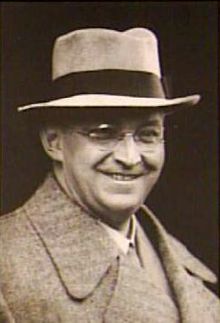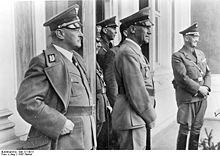- Konrad Henlein
-
Konrad Henlein 
Gauleiter Personal details Born May 6, 1898
Maffersdorf, Bohemia, Austro-Hungarian EmpireDied May 10, 1945 (aged 47)
Pilsen, Bohemia, CzechoslovakiaPolitical party NSDAP Profession Bank clerk Konrad Ernst Eduard Henlein (May 6, 1898 – May 10, 1945) was a leading pro-Nazi ethnic German politician in Czechoslovakia and leader of Sudeten German separatists. After Nazi German annexation of Bohemia he was named Gauleiter, regional party leader, and held that position through the Second World War.
Contents
Early life
Henlein was born in Maffersdorf, Bohemia, Austria-Hungarian Empire, now Vratislavice, Liberec, Czech Republic. In light of his being a leader of the Sudeten German movement, Henlein's origin was not without problems. His mother, Hedvika Anna Augusta Dvořáček, was daughter of a German-speaking mother but her father was Czech. As Henlein pursued a policy against mixed marriages after 1938, he was forced to change his still-living mother's name from Dvořáček to the more German spelling of Dworatschek, which would be thus more comfortable for Henlein's career as a high Nazi official.
He attended a business school in Jablonec nad Nisou. After serving in the Austrian army in the First World War, during which he spent time in Italian captivity, and the subsequent breakup of Austria-Hungary, he worked as a bank clerk in Czechoslovakia while taking an active part in Sudeten German communal life.
Leader of SdP
In the first half of the 1930s, Henlein held a pro-Czechoslovak and overtly anti-Nazi view[1] in his public speeches and did not become a follower of Adolf Hitler until 1937, when the pro-German camp within the Sudeten German Party (SdP) represented by Karl Hermann Frank emerged victorious. He then swiftly aligned himself with the slogan Ein Volk, ein Reich, ein Führer! ("One People, One Country, One Leader!"), thus calling for the predominantly (typically more than 80%) German-speaking Sudetenland to be a part of Germany.
Henlein's political party's dominance of the Sudetenland in the 1930s contributed to the Munich Agreement on September 30, 1938, which was due in part to his influence with the British delegate Lord Runciman during the latter's visit of Czechoslovakia. Henlein presented his party's policy as striving to fulfill the "justified claims" of the then largely nazified German minority in Czechoslovakia. Henlein, often under direct orders from Berlin, deliberately worked to help create a sense of crisis that was useful to Hitler's diplomatic and military efforts; as he once put it himself "We must make demands that cannot be satisfied".
In September 1938, he helped organize hundreds of terrorist attacks and two coup attempts in the Sudetenland immediately after Hitler's frenetic and threatening speech in Nuremberg at the Nazi Party's annual rally. Since the attempted uprising was quickly suppressed by Czechoslovak forces, Henlein fled to Germany and made numerous intrusions into Czechoslovak territory as a commander of Sudeten German guerilla bands of Freikorps.
After Germany's absorption of the Sudetenland, Henlein's party merged with Hitler's NSDAP on November 5, 1938. Henlein then became Gruppenführer (later Obergruppenführer) SS and a Reichstag deputy. In March and April 1939 he served as the head of civil service in the Protectorate of Bohemia and Moravia but soon most of the power went to the hands of another Sudeten German politician, Karl Hermann Frank. On May 1, 1939 he was named Gauleiter of the Sudetenland, a position he held until the end of the war.
Newer research shows his position within the SdP was very difficult after 1935. Reinhard Heydrich and others made several attempts to remove him from power supposedly because he was not radical enough. In 1937 Heinz Rutha, one of his closest allies was tipped off to the Czech authorities by German secret service and imprisoned for alleged homosexuality. After 1938 Henlein worked as a spy for the British and had conspirative contacts with Wilhelm Canaris.[2][3]
In May 1945, while in American captivity in the barracks of Plzeň, he committed suicide[4] by cutting his veins with his broken glasses. He was buried anonymously in the Pilsen Central Cemetery.
In fiction
In Harry Turtledove's "Hitler's War", Henlein is assassinated by a Czech named Jaroslav Stribny around September 28, 1938. Hitler, in the story, then starts World War II two days later on September 30, 1938 - much earlier than it does in our history time line.
Summary of his career
Dates of rank
- SS-Gruppenführer: ?
- SS-Obergruppenführer: June 21, 1943
Notable decorations
- War Merit Cross without swords Second (?) and First (?) Classes
- SS Honour Ring (?)
- Golden Party Badge (?)
- Wound Badge in Black (?)
See also
- Germans in Czechoslovakia (1918-1938)
References
- ^ Czechoslovak Office of Foreign Affairs, Two Years of German Oppression in Czechoslovakia (London, 1941) p.25
- ^ http://www.welt.de/print-welt/article581192/Kohen_ist_nicht_zu_fassen.html/
- ^ http://janus.lib.cam.ac.uk/db/node.xsp?id=EAD%2FGBR%2F0014%2FCHRS
- ^ "Konrad Henlein". Encyclopædia Britannica. http://www.britannica.com/EBchecked/topic/261248/Konrad-Henlein. Retrieved July 5, 2009.
External links
Categories:- 1898 births
- 1945 deaths
- People from Liberec
- Nazi leaders
- Gauleiter
- SS generals
- Czechoslovak politicians who committed suicide
- Bohemian-German people
- Sudeten German Party politicians
- Nazis who committed suicide in prison custody
Wikimedia Foundation. 2010.

